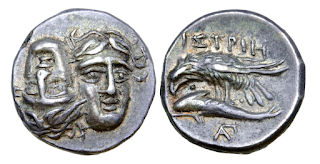I saw this coin earlier today, and thought it looked interesting. I decided to "dig around a bit" and recorded what I found as I found it in this impromptu "thread" on Twitter...And what I have found is truly amazing...I think...
Seriously cool coin.
Moesia, Istros. Drachm. C. 280-250 BC. Aeginetic standard. Two young male heads facing, side by side, one up, the other down (???). Sea-eagle to left, eating fish (not dolphin); IΣTPIH above, AΠ monogram below. Found on this auction page.
Whose heads are these? Interestingly, another Istros coin which also has Sea-eagle eating fish on the reverse has "Diademed head of Apollo" on the obverse. Moesia, Istros Æ20. Circa 125-100 BC...
The eagle is most likely the white tailed eagle which inhabits the whole of Europe (at least once did). Great pic of a white tailed eagle swooping down on a fish by Ron Velner from this report about white tailed eagles gathering in Oder Delta in late summer to feast on fish stranded in shallows...
Interesting: "There is evidence of strong seasonal shifts in food habits [of the white tailed eagle]...usually the largest portions of fish are caught during warmer months..."
Because of the low water levels and the fact that the fish are feeding in the shallows during the summer...
From "Fishing in Bulgaria": With the warming of the weather the fish...start getting active and move to shallow waters..."
So I believe that the scene depicted on the Istros coins possibly represents the warm part of the year, when white tailed eagle feeds on fish...
Now this is very very interesting...There are actually Istros coins where the eagle is actually clutching a dolphin...
C. 4th Century BC. Facing male heads, the right inverted. Sea-eagle left, grasping dolphin with talons; IH monogram below dolphin.
Now I suspected from the beginning that this was an animal solar calendar marker, but now I am absolutely sure that this is definitely an animal solar calendar marker...White tailed eagles don't catch or eat dolphins. Why are these two animals depicted like this together???
Here are pics of dolphins from the Black sea.
I would say that the dolphin on the coin is the Bottlenosed dolphin. See the round forehead bulge before the beak?
"Shallow waters of the north Black Sea coast are known as important breeding, calving and feeding grounds for Black Sea dolphins during warm season"..."Female fertility peaks in June, male fertility peaks in July"..."Gestation last 12 months"...Which means that it is June-July when most dolphin babies are born too...
From: "The current status of bottlenose dolphins (Tursiops truncatus) in the Black Sea"
So maybe dolphin is on the coin because the breeding seasons for both the white tailed eagle and the Black Sea bottlenose dolphins overlap with the warm part of the year...
Well, well, well...
It seems the reason why the coin shows an eagle eating a dolphin is much much weirder and cooler...
There is a period of the year, when a white tailed eagle living near the ancient Istros, could have been seen by people actually eating a dolphin. An already dead dolphin. A stranded dolphin. Like this harbour porpoise stranded in Zatoka, Odessa region..
In 2017 a study of Black Sea dolphins was being conducted in Ukraine...The results were published in "Identification and initial assessment of cetacean groupings in coastal waters of the north-western Black Sea, Ukrainian sector" And some very very weird things were observed. Weird and really important for understanding of the meaning of the scene depicted on the ancient Istros coins...
115 cases of dolphin strandings were registered, starting from late March and peaking in May (48), June (40) and July (43). The number of reported cases significantly decreased since the early August...Wow...
Why all these dolphins were getting stranded, no one really knows...
But what we do know is that the dolphin stranding season, during which you can see a white tailed eagle feasting on dead dolphins, starts right after the spring equinox, peaks during the summer and then (probably) ends by autumn equinox.
The time of the year ruled by Apollo...Hence the head of Apollo on the obverse of one of the versions of this coin.
But what about the weird "two young male heads facing, side by side, one upright, the other inverted" obverse? Well, guess what's in the middle of summer which is in the middle of the dolphin stranding season? Well mid summer of course...Summer solstice...
Marked by Gemini zodiac sign (21st of May - 21st of June)...
The twin brothers Dioscuri, holding torches in hands, extinguished & hot...
Why?
Or the Head of Apollo pointing up (day increasing before summer solstice) and the Head of Apollo pointing down (day decreasing after summer solstice)???
Is this what is depicted on this strange and beautiful coin?
You have been watching live investigation of the meaning of the Istros "eagle eating dolphin" coin in real time 🙂 It took 2 hours from the moment I saw this coin for the first time. Thank you for your following...
PS: I just became aware of another Pontic kingdom that minted coins with eagle eating dolphins. The Kingdom of Cappadocia.










Hello. Do you think Gemini is a solar marker similar to the animal symbols in the zodiac? Or just an add-on from the Greek story? Seems being the symbol for summer solstice it might have an even earlier origin
ReplyDeleteAquarius - snow melt begins
DeleteGemini - summer solstice, sun observed between two posts of the solar observatory, the solar gate. like this http://oldeuropeanculture.blogspot.com/2017/09/boaz-and-jachin.html
Virgo - beginning of the cooling of the northern hemisphere
Sagittarius - beginning of the fur hunting season...